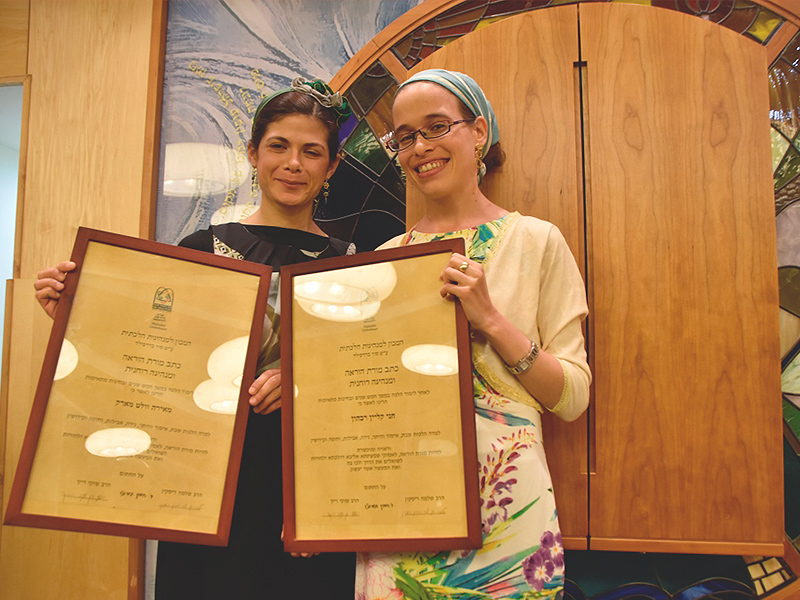Amid all the troubling concerns about safety and security in Jerusalem, a good news story unfolded here on Oct. 20 at Midreshet Lindenbaum, a post-high school institute for women’s learning. Over 300 people gathered to celebrate the graduation of Meira Welt Maarek and Chani Klein Ravhon from the Susi Bradfield Women’s Institute for Halakhic Leadership (WIHL). Like me, much of the crowd was there to celebrate an auspicious historic event.
These two women (who are actually the third and fourth graduates of WIHL, preceded by Idit Bartov and Anat Novoselsky) completed a rigorous five-year course of full-time study of Talmud and Halachah, covering kosher food, Sabbath laws, family purity, mikvot, mourning, marriage and conversion. In other words, they mastered a curriculum identical to that of the men training for rabbinical ordination and passed similar examinations. Thus they are equal in knowledge and skill to their male rabbinical counterparts. (Full disclosure: when I was ordained as an Orthodox rabbi 40 years ago, I was tested on a significantly narrower range of areas of Jewish law than these women.)
Why was this event so significant?
Many of us remember the vast number of areas of advanced study that used to be closed to women. A century ago, women had virtually no opportunities to study and become doctors, lawyers or professors. Happily, society has changed and intellectual areas of study are no longer the exclusive domain of men. Women’s intensive study of Jewish legal texts has expanded greatly in the same period, but not at the same pace as in the secular world.
Just as people used to assume that women were not cut out for secular intellectual fields of study, many Jews assumed that Talmud cannot be properly understood by a woman’s brain. A hundred years ago, even teaching women Hebrew was felt to be unimportant in some circles.
Sixty years ago, there were still no schools where a woman could pursue high-level intensive study of the Talmud and codes of Jewish law. But society’s attitudes to women’s intellectual capabilities changed, and Rabbi Joseph B. Soloveitchik, the acknowledged 20th-century leader of American Orthodox Judaism, gave his blessing to women’s Talmud study back in the middle of the 20th century.
Since Rabbi Soloveitchik’s time, excellent schools and programs for women to study Talmud rigorously have opened, mostly here in Israel but also in the United States. (Sadly no such programs exist in Canada.) Many Canadian, American and Israeli Orthodox young women (including two of my daughters) were introduced to intensive Talmud study right in the study hall of Midreshet Lindenbaum, the same place where the ceremony took place on Oct. 20.
Jewish tradition has always encouraged the idea of Torah lishmah, the study of Torah for its own sake, not for any title or certificate. Most men and women who study Talmud intensively study lishmah.
But halachic Jews also need certified religious leaders who are experts in Talmud and Halachah, marriage counsellors who deeply understand Jewish tradition, texts and values, and spiritual leaders to bring us appropriate Jewish messages when we mourn or when we are sick. Women who have the proper training serve in such roles as effectively as male rabbis.
Furthermore, every halachic Jew needs to have a person to whom he or she can turn for rulings on complicated questions of Jewish law. Whenever halachic Jews follow a rabbi’s ruling, they are relying on the fact that the rabbi was “ordained,” i.e. was declared to be a moreh horaah, a person who has passed the tests and is thus deemed reliable to rule.
A few decades ago, again here in Jerusalem, at an institution called Nishmat, an innovative program was begun to give women intensive instruction in the rules of “family purity, on the reasonable assumption that a woman questioner would feel freer discussing her intimate life with another woman than with a male rabbi. The graduates of that program pass tests and receive the title yoatzot Halachah (halachic advisers), thus certifying that a questioner could rely on the ruling of that yoetzet.
The event here in Jerusalem on Oct. 20 is simply the next logical step. Two brave women, who had already spent many years studying Torah lishmah, decided to dedicate five more years to full-time study. They passed the customary tests and were given the titles manhigah ruchanit (spiritual leader) and morat horaah (the feminine form of moreh horaah, i.e. a woman whose halachic rulings may be relied on).
Naysayers still abound. Recently, after a heated and lengthy debate, the Rabbinical Council of America (RCA) decided by majority vote to reject the idea of women serving in rabbinic positions, even if they are not called rabbis.
But in Israel, many rabbis are more open. Dozens of Orthodox rabbis attended this graduation. The speakers deserve special mention: Rabbi Shlomo Riskin, chief rabbi of Efrat and head of the Ohr Torah Stone (OTS) network of educational institutions, which includes Midreshet Lindenbaum and the WIHL; Rabbi David Stav, chief rabbi of Shoham, head of the Tzohar rabbinical organization in Israel and newly appointed co-chancellor of OTS; and rabbis Yehoshua Reich and Shmuel Klitsner, who run the program.
They are all to be congratulated for standing up to opposition to bringing Orthodox Judaism into the 21st century, and primarily for giving the halachic community two excellent new spiritual leaders. And let us hope that Torah will go forth from Zion and will have an influence on the Orthodox Jews of North America, too.
Martin Lockshin, a former professor at York University, made aliyah this summer
